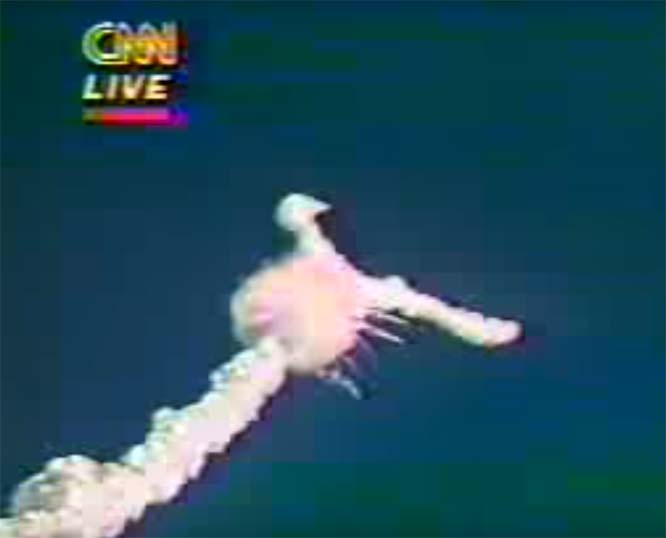 The Challenger explodes in real time.
The Challenger explodes in real time.
As a federal shutdown lumbered through its fourth week, House Speaker Nancy Pelosi, D-Calif., on Wednesday sent a letter to President Donald Trump, urging him to postpone his Jan. 29 State of the Union address because of shutdown-related security reasons. Perhaps Trump could deliver his speech in writing that day, Pelosi suggested.
The letter was immediately described as a "power move" against Trump and as Pelosi "playing hardball" by threatening to deprive the president of a stage and an audience. Meanwhile, the GOP decried it as "unprecedented" partisanship, with some (including Trump's eldest son) accusing Pelosi of attempted censorship.
Pelosi waved off criticisms, maintaining that she was genuinely concerned about security and gently twisting the knife further by telling reporters Trump could "make the speech from the Oval Office instead, if he wants." As of Wednesday afternoon, the White House had not responded to the letter.
But postponing a State of the Union address is not unprecedented. It last happened more than three decades ago - though at the time, it was rescheduled because of a national tragedy.
On the morning of Jan. 28, 1986, a Tuesday, President Ronald Reagan was in the Oval Office, making final preparations for a State of the Union address he was scheduled to give on television later that night. He had hoped to strike an optimistic tone, highlighting the country's economic growth in his second term as president.
Nearly 1,000 miles to the south, the Space Shuttle Challenger was preparing for launch. The seven astronauts on board - including, for the first time, civilian teacher Christa McAuliffe - would never make it to space.
During Reagan's briefing, his communications director interrupted with an alarming message: "Mr. President, the shuttle's blown up!"
A surreal scene unfolded in the White House Roosevelt Room, where preparations for the State of the Union continued amid "a state of confusion and numbness," as The Washington Post's David Hoffman reported then:
"There, the president's top assistants continued discussing the State of the Union message with television correspondents while, in the background, the scene of the exploding space shuttle was repeated on a large television screen that had been wheeled into the room.
"Whenever a news bulletin about the disaster was broadcast, an aide signaled White House chief of staff Donald T. Regan, who stopped the discussion in the room to hear the latest developments.
"An hour and twenty minutes after the explosion, the president came into the Roosevelt Room for what was supposed to be a sales pitch for the State of the Union address. Standing by a fireplace at the head of a long, oval table, Reagan immediately acknowledged to the television correspondents that there wasn't much sense in talking about the details of the planned speech that night."
Despite the tragedy, Reagan's first desire was to press forward with the State of the Union speech as scheduled, even if it needed to be revised.
He might have been motivated by history. Since 1913, when then-President Woodrow Wilson revived the practice of addressing Congress in person, plans for the State of the Union address had been significantly changed or delayed twice, according to the House of Representatives archives.
Once was in 1944, when President Franklin Roosevelt decided not to not address Congress but rather to deliver his speech in writing and also read it as a live radio broadcast. In 1946, President Harry Truman postponed his State of the Union by four days and chose to deliver his address in writing.
"There could be no speech without mentioning (the Challenger tragedy)," Reagan told television correspondents and aides immediately after the disaster. "But you can't stop governing the nation because of a tragedy of this kind. So, yes, one will continue."
But the consensus on Capitol Hill, from Republicans and Democrats, was to postpone the speech; first lady Nancy Reagan reportedly also urged her husband to reschedule. At last, Reagan agreed and the White House soon announced that the State of the Union would be pushed back until the following Tuesday.
Reagan would still appear on television that night, but to give a very different address to a nation in shock and grief. It would go down in history as one of the most beloved speeches of his career.
"Ladies and gentlemen, I'd planned to speak to you tonight to report on the state of the union, but the events of earlier today have led me to change those plans," a visibly moved Reagan said from the Oval Office. "Today is a day for mourning and remembering. Nancy and I are pained to the core by the tragedy of the shuttle Challenger. We know we share this pain with all of the people of our country. This is truly a national loss."
At one point, the camera trained more closely on Reagan's face as he spoke directly to the schoolchildren who might have watched the Challenger Shuttle takeoff live.
"I know it is hard to understand, but sometimes painful things like this happen," Reagan said. "It's all part of the process of exploration and discovery. It's all part of taking a chance and expanding man's horizons. The future doesn't belong to the fainthearted; it belongs to the brave. The Challenger crew was pulling us into the future, and we'll continue to follow them."
Every weekday JewishWorldReview.com publishes what many in the media and Washington consider "must-reading". Sign up for the daily JWR update. It's free. Just click here.
(COMMENT, BELOW)


 Contact The Editor
Contact The Editor
 Articles By This Author
Articles By This Author